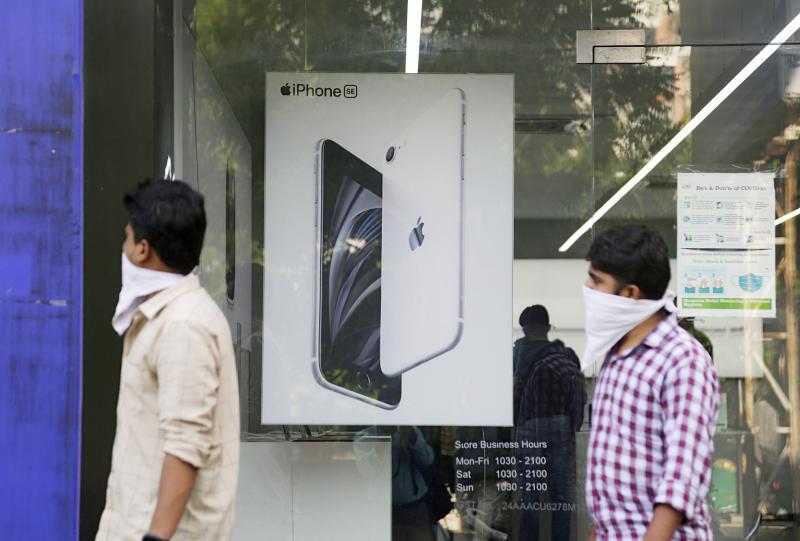Apple Inc next week is to launch its first online store in India, the Silicon Valley giant said yesterday, hoping to cash in on the country’s festive season and grow its tiny share of the booming market.
The firm is a small player in India, where sales of its smartphones lag those of South Korean rival Samsung Electronics Co, with the iPhone maker pricing itself exclusively at the luxury end of the market.
Its renewed push into India comes as Asia’s third-largest economy has hit a record slump due to a months-long COVID-19 lockdown.

Photo: AP
India’s busiest shopping season usually begins next month, with stores offering steep discounts and freebies to customers looking to splurge on big-ticket items as they celebrate popular Hindu festivals, including Dussehra and Diwali.
Apple’s online store, which is to open for business on Wednesday next week, would offer “a range of affordability options,” including discounts on Macs, iPads and tech accessories for students, the company said in a news release.
Shoppers could buy AirPods, iPads and Apple Pencils engraved in English, Hindi and a range of other Indian languages.
Apple currently sells through third-party retailers in India, including Amazon, and the country is seen as a huge potential market for the firm due to its giant 1.3 billion population and relatively low number of smartphone owners.
The company has only a 2 percent share of the Indian market, industry estimates show.
An application to open Apple Stores in India in 2016 was reportedly rebuffed because of a rule stating that foreign retailers must source 30 percent of their products locally.
The Indian government has since relaxed the rules, giving companies up to eight years to meet the sourcing requirements, as part of a push to attract foreign investment and create jobs.
Some of its smartphones, including the iPhone 11, are assembled at facilities operated by Taiwanese manufacturers Hon Hai Precision Industry Co (鴻海精密) and Wistron Corp (緯創) in the southern Indian cities of Chennai and Bangalore.

Taiwan’s technology protection rules prohibits Taiwan Semiconductor Manufacturing Co (TSMC, 台積電) from producing 2-nanometer chips abroad, so the company must keep its most cutting-edge technology at home, Minister of Economic Affairs J.W. Kuo (郭智輝) said yesterday. Kuo made the remarks in response to concerns that TSMC might be forced to produce advanced 2-nanometer chips at its fabs in Arizona ahead of schedule after former US president Donald Trump was re-elected as the next US president on Tuesday. “Since Taiwan has related regulations to protect its own technologies, TSMC cannot produce 2-nanometer chips overseas currently,” Kuo said at a meeting of the legislature’s

TECH WAR CONTINUES: The suspension of TSMC AI chips and GPUs would be a heavy blow to China’s chip designers and would affect its competitive edge Taiwan Semiconductor Manufacturing Co (TSMC, 台積電), the world’s biggest contract chipmaker, is reportedly to halt supply of artificial intelligence (AI) chips and graphics processing units (GPUs) made on 7-nanometer or more advanced process technologies from next week in order to comply with US Department of Commerce rules. TSMC has sent e-mails to its Chinese AI customers, informing them about the suspension starting on Monday, Chinese online news outlet Ijiwei.com (愛集微) reported yesterday. The US Department of Commerce has not formally unveiled further semiconductor measures against China yet. “TSMC does not comment on market rumors. TSMC is a law-abiding company and we are

FLEXIBLE: Taiwan can develop its own ground station equipment, and has highly competitive manufacturers and suppliers with diversified production, the MOEA said The Ministry of Economic Affairs (MOEA) yesterday disputed reports that suppliers to US-based Space Exploration Technologies Corp (SpaceX) had been asked to move production out of Taiwan. Reuters had reported on Tuesday last week that Elon Musk-owned SpaceX had asked their manufacturers to produce outside of Taiwan given geopolitical risks and that at least one Taiwanese supplier had been pushed to relocate production to Vietnam. SpaceX’s requests place a renewed focus on the contentious relationship Musk has had with Taiwan, especially after he said last year that Taiwan is an “integral part” of China, sparking sharp criticism from Taiwanese authorities. The ministry said

US President Joe Biden’s administration is racing to complete CHIPS and Science Act agreements with companies such as Intel Corp and Samsung Electronics Co, aiming to shore up one of its signature initiatives before US president-elect Donald Trump enters the White House. The US Department of Commerce has allocated more than 90 percent of the US$39 billion in grants under the act, a landmark law enacted in 2022 designed to rebuild the domestic chip industry. However, the agency has only announced one binding agreement so far. The next two months would prove critical for more than 20 companies still in the process